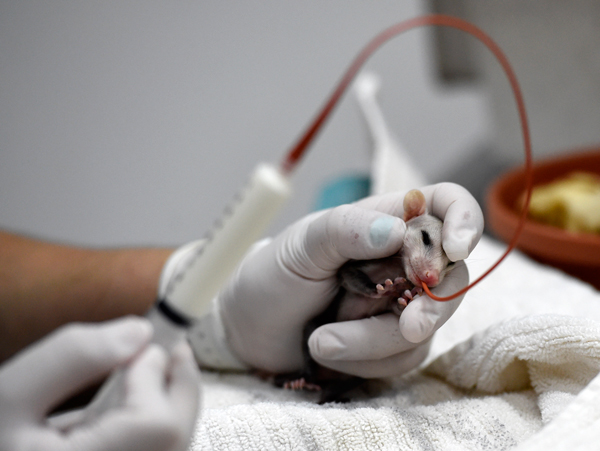Florida exotic pet trade sends wildlife rescues soaring
In this small animal hospital perched on Miami's sun-splashed harbor, some of the most exotic creatures fly in and out of Carla Zepeda's life.
From peacocks to pelicans, opossums to owls, Zepeda is part of a six-member staff that cares for both the furry and the feathered at the Pelican Harbor Seabird Station, one of south Florida's oldest wildlife rescue centers.
Though it began in the 1980 as a place for injured wild pelicans, pet birds are increasingly common, like one of the newest arrivals, a fluffy green Quaker parakeet.
The bird landed on a man's shoulder, appearing malnourished and with bruises around its beak, so it was brought to the Pelican Harbor Seabird Station for care.
"Here in Miami we deal a lot with the exotic pet trade," says rescue and release coordinator Zepeda, 22. "A lot of escaped pets or released pets."
"We now have a very high population of Quaker parakeets, which weren't here before and are doing great in the wild."
Also known as monk parrots or Quaker parrots, Quaker parakeets (Myiopsitta monachus) are native to South America, but have established their own wild colonies here, forming loudly chattering flocks that fly over Miami and its mango tree-lined suburbs.
"Now the problem with that is they are not native species and they are taking up nesting space from blue jays, red-bellied woodpeckers and even eastern screech owls," says Zepeda.
"Released pets or escaped pets make a big impact on the environment."
Zepeda says the center will try to find a new caretaker for the recent arrival, whose friendly nature could pose a danger to its survival in the wild.
With more than one thousand patients already this year, the center is barreling toward another record, according to executive director Christopher Boykin.
"The number grows every year. We treated 1,968 in 2014 and 2,010 in 2015," he said.
"We anticipate another record breaking year."
More local residents are becoming aware of the rescue facility, which helps drive the numbers, he said. A total of 146 different species came into the center last year.
|
 A rescued baby opossumis fed by clinic worker Carla Zepeda at the Pelican Harbor Seabird Station, a nonprofit wildlife rehabilitation facility inMiami, Florida. Rhona Wise / Agence France Presse |
























